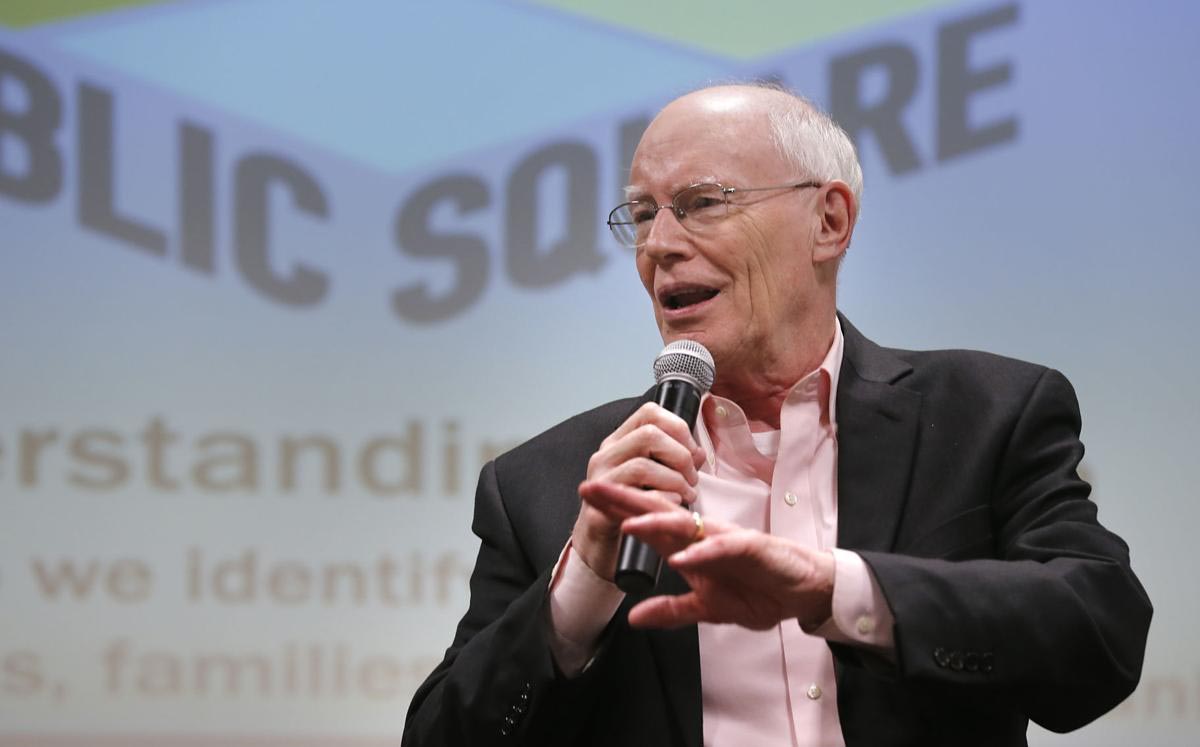Dr. Wehman featured as panelist in RTD Public Square on autism
By C. Suarez Rojas, Richmond Times-Dispatch
csuarez@timesdispatch.com
January 30, 2019

Rehabilitation Research and Training Center, speaks as a panelist during the RTD Public
Square 76: Understanding Autism. (Photo by Alexa Welch Edlund/Times-Dispatch)
Addressing questions about autism and people who are diagnosed with the developmental disorder, attendees of the Richmond Times-Dispatch’s 76th Public Square on Wednesday said there needs to be more social inclusion, robust advocacy and planning for the future.
Nearly 150 people attended the forum at the newspaper’s downtown offices, including experts, people diagnosed with autism spectrum disorder, their families, doctors, and direct service providers.
In opening remarks, The Times-Dispatch’s president and publisher, Thomas A. Silvestri, explained that a controversial editorial about autism that appeared in the newspaper in November prompted an apology and a promise to host a community discussion.
“Whatever the intent of that editorial ... it misfired,” Silvestri said. “In particular, we should have never referred to autism as ‘everybody’s problem.’ That was a poor choice of words, to say the least.”
Wednesday’s forum came together after a series of meetings and discussions with autism advocates.
Ann Flippin, executive director of the Autism Society of Central Virginia and one of the Public Square’s five panelists, said she and her colleagues were grateful for the opportunity to promote “an honest dialogue” about autism.
“We’re proud to bring together a panel that represents a snapshot of the diversity of the autism community,” Flippin said. “My hope for this evening is to have a meaningful conversation about creating opportunities for all individuals with autism, their families and the community.”
Moderated by Silvestri, the event began with the panelists answering prepared questions regarding the public perception of people with autism, the opportunities they have, and what success looks like for them.
Shantell Davis, a mother to a child with autism and a licensed practical nurse with Bon Secours and Children’s Hospital of Richmond at VCU, said one of the biggest challenges faced by parents is knowing how to advocate for themselves when working with school systems to develop lesson plans for their children.
“Were there times where we were angry, fussing, crying, cussing? All of that stuff happened,” said Davis, who was one of the forum’s panelists. “You have to be a champion for your child. ... You can’t be prideful about your situation. Whatever it is, ask questions and expect results when you ask for something.”
Others at the forum said there needs to be more awareness of autism, particularly how it affects adults and can result in a wide variety of challenges and symptomatic behaviors, some of which are not typically noticed or understood.
“Now that we have an 18-year-old [son with autism], we are navigating that maze families have to face when their children enter early adulthood,” said Dr. M. Taruj Ali, a panelist and the medical director of Pulmonary Associates of Richmond Sleep Clinics. “We need to realize that autism is lifelong. It doesn’t end when you transition to adulthood. It’s a lifelong struggle.”
Panelist Heidi Lawyer, executive director of the Virginia Board for People with Disabilities, and the parent of an adult with autism, said families with children diagnosed with autism should prepare for adulthood at an early age, but be open to making changes depending on the severity of their condition and what might happen as they get older.
Another panelist, Hallie Hovey-Murray, a College of William & Mary law student who was diagnosed with autism spectrum disorder, said there are many stereotypes about people with autism.
“We often take one person with autism that we’ve met and think that applies to everyone,” she said. “There are people being left behind because teachers are only looking at the diagnosis and not the things they can bring to the table.”
Dr. Paul Wehman, a panelist and the director of VCU’s Autism Center for Excellence and of the VCU Rehabilitation Research and Training Center, said the broader community must also work toward making Richmond more “autism-friendly.”
“Our folks need to be seen and participate,” he said. “They need to be shown they are just like everybody else. We need everybody in the community to buy into that.”
In the latter half of the forum, attendees were invited to ask the panelists questions or speak openly about autism.
Several speakers noted that police, doctors and teachers must be better trained to understand how they can serve people with autism and their families, describing challenges they have personally faced with various institutions.
The audience applauded when Bryce Norden, a 19-year-old who recently graduated from Glen Allen High School, described the challenges he faced as a high-performing student with Asperger’s syndrome who struggled to socialize with his classmates. Asperger’s is a form of autism.
The last person to comment, Ashly Richards, the mother of a 7-year-old diagnosed with autism, said families should not feel ashamed.
“I think one of the biggest thing I want people to understand is that there’s nothing wrong with anyone on the autism spectrum. They just think differently,” she said.
“If we can stop apologizing or making excuses for them, maybe other people will stop thinking there’s something wrong.”